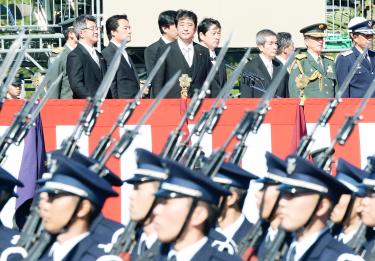Japanese Prime Minister Shinzo Abe told Japanese troops yesterday that Japan would not tolerate the use of force to change the region’s “status quo,” comments likely to rile Beijing, which is locked in a long and bitter territorial dispute with Tokyo.
“Use of force for changing the status quo” is an expression often used by Japanese politicians and security experts to indirectly refer to what they see as China’s aggressive maritime expansion in the East China Sea and the South China Sea.
Abe’s comments are the second in as many days in which he has effectively said Japan is ready to be more assertive toward China.
They came as Chinese military aircraft flew near Japan for a third day in a row, prompting Tokyo to scramble fighter jets each time.
Abe is seen as a hawkish nationalist who wishes to revise a post-war pacifist constitution drafted by the US and strengthen Japan’s defense posture.
His comment yesterday, made at an annual troops review, comes after the Chinese Ministry of Defense warned Japan not to underestimate China’s resolve to take whatever measures necessary to protect itself.
“Development of weapons of mass destruction and ballistic missiles by North Korea. Provocation against our sovereignty. The security environment surrounding Japan is getting tougher,” Abe told the military review, which consisted of about 3,900 troops, 240 vehicles and 50 aircraft.
“In order to show our firm national intention that changing the status quo by force will not be tolerated, we need to carry out various activities, such as surveillance and information gathering,” he said.
In the latest sign of tensions between the region’s two heavyweights, Japan yesterday scrambled fighter jets after two Chinese bombers and two airborne early warning planes flew near Japan’s southern islands into the Pacific and then back into the East China Sea. No violation of Japanese airspace took place.
The same formation of Chinese aircraft made similar flights on Friday and Saturday.
Source: Taipei Times - 2013/10/28





















